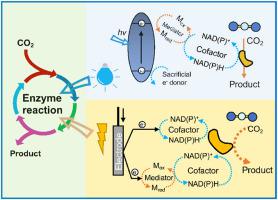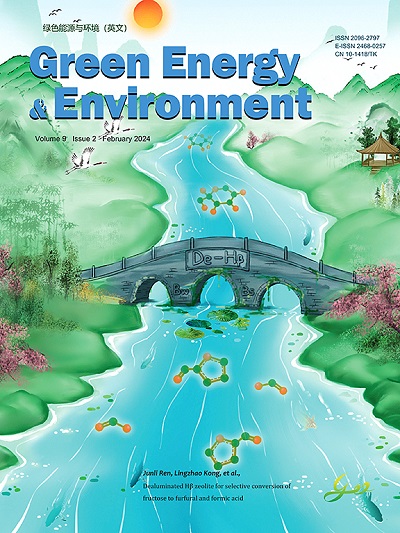无细胞生物催化与光催化和电催化相结合:高效的二氧化碳转化为化学物质
IF 10.7
1区 工程技术
Q1 CHEMISTRY, PHYSICAL
引用次数: 0
摘要
大气中二氧化碳(CO2)浓度的增加暴露了地球生态环境的一系列危机。如何有效地将二氧化碳固定并转化为具有附加值的产品,已经引起了许多研究者的关注。电和光耦合的无细胞酶催化系统是近年来生物固碳领域的一种有前途的尝试。本文系统综述了光酶催化、电酶催化和光电酶催化在无细胞体系中将二氧化碳转化为化学产物方面的研究进展。重点综述和比较了无细胞体系中光酶催化和电酶催化的各种偶联方法和原理,特别是偶联体系构建中使用的材料,并分析和指出了不同偶联方法的特点和可能存在的问题。最后,我们讨论了耦合物理信号和无细胞酶催化系统在二氧化碳固定领域的主要挑战和前景,并提出了提高此类系统固碳能力的可能策略。本文章由计算机程序翻译,如有差异,请以英文原文为准。

Cell-free biocatalysis coupled with photo-catalysis and electro-catalysis: efficient CO2-to-chemical conversion
The increasing atmospheric carbon dioxide (CO2) concentration has exposed a series of crises in the earth’s ecological environment. How to effectively fix and convert carbon dioxide into products with added value has attracted the attention of many researchers. Cell-free enzyme catalytic system coupled with electrical and light have been a promising attempt in the field of biological carbon fixation in recent years. In this review, the research progresses of photoenzyme catalysis, electroenzyme catalysis and photo-electroenzyme catalysis for converting carbon dioxide into chemical products in cell-free systems are systematically summarized. We focus on reviewing and comparing various coupling methods and principles of photoenzyme catalysis and electroenzyme catalysis in cell-free systems, especially the materials used in the construction of the coupling system, and analyze and point out the characteristics and possible problems of different coupling methods. Finally, we discuss the major challenges and prospects of coupling physical signals and cell-free enzymatic catalytic systems in the field of CO2 fixation, suggesting possible strategies to improve the carbon sequestration capacity of such systems.
求助全文
通过发布文献求助,成功后即可免费获取论文全文。
去求助
来源期刊

Green Energy & Environment
Energy-Renewable Energy, Sustainability and the Environment
CiteScore
16.80
自引率
3.80%
发文量
332
审稿时长
12 days
期刊介绍:
Green Energy & Environment (GEE) is an internationally recognized journal that undergoes a rigorous peer-review process. It focuses on interdisciplinary research related to green energy and the environment, covering a wide range of topics including biofuel and bioenergy, energy storage and networks, catalysis for sustainable processes, and materials for energy and the environment. GEE has a broad scope and encourages the submission of original and innovative research in both fundamental and engineering fields. Additionally, GEE serves as a platform for discussions, summaries, reviews, and previews of the impact of green energy on the eco-environment.
 求助内容:
求助内容: 应助结果提醒方式:
应助结果提醒方式:


